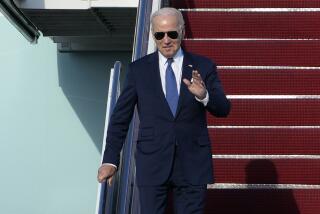A Bosnian Blueprint for Afghanistan
- Share via
With the collapse of the Taliban, a multinational force becomes a likely guarantor of Afghanistan’s immediate future. It is no small irony that in this, the Bush administration may need to take lessons from the Balkan peacekeeping missions it has viewed with skepticism.
Proposals for a multinational force abound. Secretary of State Colin L. Powell has discussed the involvement of troops from Muslim states, and Defense Secretary Donald H. Rumsfeld has signaled that U.S. troops will not be peacekeepers. Some allied troops, however--including British, French and German contingents--may participate.
Although these troops initially will focus on delivering humanitarian aid, their mission could soon evolve into nation-building. Recent history offers some useful case studies. The NATO-led mission to Bosnia, in particular, has generated a wealth of experience on how to hold together a war-torn and ethnically divided country.
There can be no easy analogies. Afghanistan is far poorer and anti-Western sentiment is much stronger. NATO’s 1995 deployment to Bosnia-Herzegovina followed months of negotiations and preparation, while the nascent mission to Afghanistan is a hurried effort to fill the post-Taliban vacuum. Some lessons, however, are clear:
* Take military options off the table for the factions. In Bosnia, NATO has the military capacity to prevent a return to fighting, and in more than five years, none of the factions has challenged NATO militarily. The specter of guerrilla warfare--a clear possibility in Afghanistan--never materialized. Moreover, NATO forces in Bosnia increasingly became adept at supporting the mission’s political and human rights goals. It is likely that the security environment in post-conflict Afghanistan will be even more tenuous and the prolonged presence of well-armed troops just as essential. A lightly armed peacekeeping force could find itself in the middle of a renewed civil war it had no power to stop.
* Remember the regional context. Real political progress became possible in Bosnia when neighboring Serbia and Croatia changed regimes and stopped encouraging the separatist tendencies of overlapping ethnic groups. In Afghanistan, international diplomats may find that the attitudes of Pakistan and Iran are almost as important as those of the various factions within Afghanistan.
* Don’t rush the vote. Nation-building requires elections, but timing matters. In Bosnia, the U.S. made the mistake of pushing for elections less than a year after fighting ended. The unsurprising result was ratification of extremist control, and several indicted war criminals were elected. A prolonged period of peace can be a vital tonic for a population disposed to heed the call of ethnic or religious extremists at the ballot box.
* Remember the political benefits of war crimes trials. While it is likely that U.S. forces will “bring justice to the terrorists,” an international tribunal may form part of a postwar settlement. Recent reports of massacres warrant investigation. While international trials must remain independent of the political process, the political work that these trials can achieve should not be forgotten. The tribunal for the former Yugoslavia has become an important ally for diplomats in postwar Bosnia. Often, the apprehension of those indicted has removed extremists who were obstructing political reform.
* Be prepared for the long haul. The Balkans have shown that outsiders have a limited capacity to reshape societies. It would be hubris to assume that a multinational force can, in short order, manufacture a legitimate, multiethnic government in Afghanistan. A lasting political settlement may be very different from the one planners initially envision, but sustained involvement will at least give the international community a say.
The United States and its allies have pursued the war on terrorism with determination. Soon, the question will become how aggressively they are prepared to struggle for peace.
More to Read
Get the L.A. Times Politics newsletter
Deeply reported insights into legislation, politics and policy from Sacramento, Washington and beyond. In your inbox twice per week.
You may occasionally receive promotional content from the Los Angeles Times.










